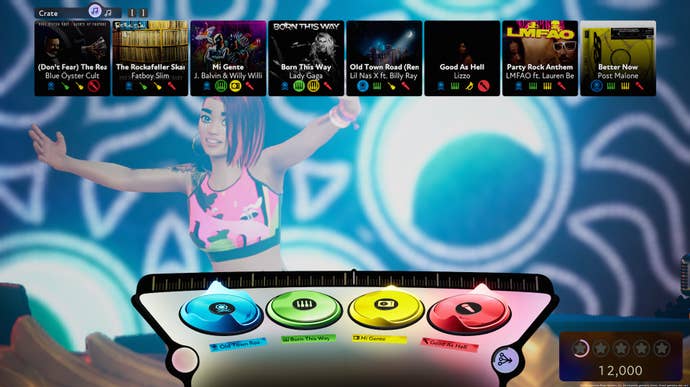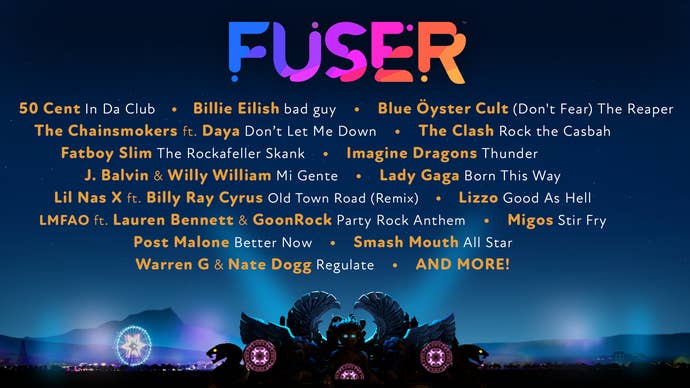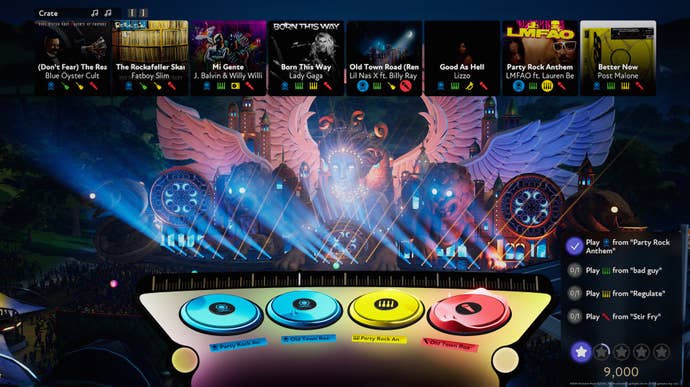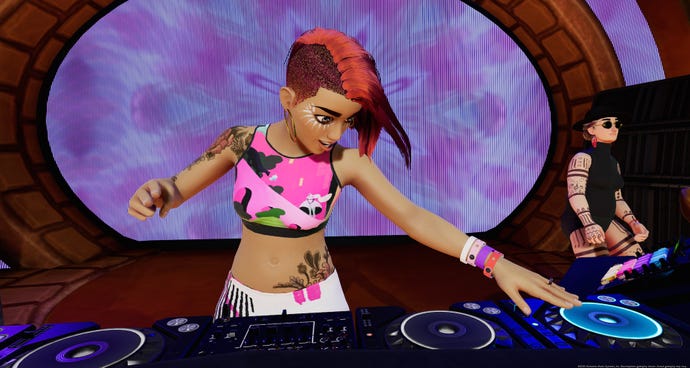Fuser Isn't Harmonix's DJ Hero, and It Won't Need a Plastic Turntable Either
Harmonix's latest, and its first big release for the Switch, is both in-line with the studio's past and feels brand new.
This article first appeared on USgamer, a partner publication of VG247. Some content, such as this article, has been migrated to VG247 for posterity after USgamer's closure - but it has not been edited or further vetted by the VG247 team.
Like so many somewhat-aimless dudes in their twenties, a few years ago I tried my hand at DJing. It's probably for the best that my dalliance with making mixes was mostly contained to the privacy of my bedroom. I was, to put it nicely, not great. When it was going well, though, it was intoxicatingly fun. Most of the work I put into it—the time spent that helped me avoid making muddy, dissonant messes—had nothing to do with my DJ gear. That time was spent listening to music in a way I never had before.
One way I can compare Fuser, Harmonix's new DJing game published by NCSOFT, to the genuine act of mixing songs is to say the game has already done a lot of the listening for you. At first glance, Fuser might look like a Rock Band spin-off with an Ibiza festival skin, but I'm not even sure I'd call it a rhythm game. There's no note highway, and even if you're only fumbling with the tools, you'll be hard pressed to make something that sounds truly bad. Put a controller in anyone's hands and I'd wager they'll produce a passable mix, worlds apart from the harsh plink-plonk of someone whiffing their first go at Guitar Hero.
Especially since Fuser uses a regular controller (it's coming to the PC, Xbox One, PS4, and Switch), its mechanics don't physically resemble that of real DJing. But, after a demo and chat with project manager Daniel Sussman, I think it's possible that Fuser is the closest Harmonix has ever gotten to translating the genuine, creative mental processes of music performance into a game.
The Record Player Is In Your Mind (And On Screen)
"This is the lightest I've ever traveled for a meeting like this," jokes Sussman when I ask about Fuser's lack of a bespoke peripheral. Sussman was Harmonix's director of hardware development for Rock Band, so there's a good chance he's spent more time lugging around plastic drums and guitars than anyone else on the planet. Fuser, by contrast, is "super refreshing" for him to show off.

At a glance, Fuser instantly reads like a Harmonix product in the vein of Rock Band or even Dance Central: first, you see a vibrant music venue populated by impossibly cool characters. There, behind the DJ equipment on stage, is your player avatar—and while they've got a deck with four turntables and an array of pads and knobs, your real-life self has a game controller and an on screen interface with four round record platters.
Those platters are color-coded, each corresponding to a different face button on the controller and to a different part of every song. The first thing the Fuser demo asks you to do is drop down a drum track; use a thumbstick to move a cursor up to the songs listed along the top of the screen, then select one using the button for drum tracks, and it'll instantly drop into place and start playing. Repeat this with a bass, melody, and vocal track and you'll have your first full Fuser mix going.
A cohesive, polished mix is a mere four button presses away (as opposed to a trainwreck of tracks playing at different keys and tempos) thanks to Harmonix's underlying mixing technology. If you're familiar with Harmonix's DropMix, the hybrid card and app-based game released by Hasbro a few years ago, you may have already surmised that Fuser uses the same tech as its foundation. It also adopts some of the same visual language for identifying the separate parts of a song.
Fuser isn't a straightforward follow-up to DropMix, though. You could certainly perform with DropMix, but even without a fancy peripheral, Fuser is designed to actually have you making compelling mixes. If DropMix is tilted more toward the joy of whatever semi-automated mash-ups it helps you produce, Fuser asks for more musical intent from its players.
Last Night A DJ Saved My Life With Gold Stars
In Fuser's regular play mode, you are being scored for your performance, and part of what determines that score is tied to your sense of rhythm. Above those four turntables on the interface is a bar that ticks along in time with the music—if you start or eject a track on the downbeat, your mix will not only sound better, but you'll score more points.
Your performance is also being judged by Fuser's digital audience of festival goers. As with Guitar Hero or Rock Band, the better your technical skills are, the better you'll go over with the audience—but this isn't a rock show. Over the course of a set, audience requests will come in like text messages. These can be open-ended genre or instrument track requests, or more granular requests for a specific song or something from a particular decade. A clock starts ticking down when requests come in, adding a time-pressure dimension to Fuser that might be best compared to fulfilling orders in Overcooked.
Let's say you've got the drums, bass, and guitar from "Don't Fear the Reaper" playing with the vocals from Post Malone's "Better Now," and two requests come in: a new vocal track and something from the '90s. Any vocal track will do for the first one. The latter request might be a bit harder if you don't know the songs in your digital crate that well—but okay, let's say you're going to cue up something from Fatboy Slim's "The Rockafeller Skank." You could fulfill both requests just by swapping in the Fatboy Slim vocals. Alternatively, you can drop in the vocals to "Old Town Road," then double up the drums by dragging and dropping the beat from Fatboy Slim to replace the Blue Oyster Cult guitar. The four tracks don't have to each be a different instrument.

This is sort of where Fuser stops doing the "work" of DJing for you and invites you to become a better listener and a better mixer. Yes, no matter what you do, if you switch tracks on the downbeat and fulfill requests, what you're doing will score you points and sound nice. There's a lot of room for creativity and expression within those bounds, however.
For example, that "crate" of songs along the top of the screen (a better analogy for today's DJing might be a USB stick, but I digress) can be customized. You'll be able to choose which tracks you bring into a performance from Fuser's list of over 100 songs, and as Sussman tells me, you'll never be caught wrongfooted by a request you can't fulfill. Don't like "All Star" by Smash Mouth? Well, you're a monster, but if you leave it out of your crate Fuser won't generate an audience request for it and tank your score.
That's all to service Harmonix's aim with Fuser, which Sussman says is to create an interactive fantasy experience of being a beloved music festival DJ—but, with a freestyle mode and deeper tools at players' disposal, Fuser could also give rise to a new kind of fame sitting somewhere between "skilled rhythm game player" and "real DJ."
No SoundCloud Here, But Please Check Out My Fuser Profile
Harmonix says there will be forms of co-op and competitive play for 2-4 players, but Fuser is also being built with in-game mix sharing and social media integration. DropMix gave players the ability to save and share their favorite mixes, but the amount of control Fuser offers over its audio and visuals means there'll be more room to carve out an identity in a pool of players.
In Fuser's visual trappings, there's no trace of the rags-to-riches story we've seen time and again in Guitar Hero or Rock Band. You won't start the game by playing a DJ set for seven disinterested patrons in a bar on a Tuesday; from the get-go, Fuser casts you as a big festival act. Harmonix plans to include 6 different venues in the game, and on top of being able to customize your DJ avatar, Sussman alludes to some other yet-unrevealed ways players will be able to choose how their performances look. That could make a Fuser performance worth watching and not just listening to.
Still, stage show aside, Fuser players will have more space to make unique performances than what its tracklist allows for. Beyond the demo, Fuser introduces some advanced features that help with creating even more refined mixes: You can change the key or tempo of your mix at will, set up and cue transitions into a new mix, and even add some custom instrumentation. Either on-the-fly or with pre-set recordings, you'll be able to layer in new sounds from in-game drum machines, arpeggiators, and so on during your mix.
In the demo of Fuser's more sophisticated features, the thing that clicks most with my baby DJ brain are special markers along the timing bar synced to specific phrases in a vocal track. Every mix I ever bothered recording with my cheap Traktor deck came after hours of playing a set of tracks over and over, listening to the contours of individual instrument parts and committing the best lines and sections to memory. Harmonix is essentially baking some of those listening epiphanies right into Fuser's UI.

Is Fuser being designed first and foremost as an on-ramp to actual DJing? No, says Sussman, and I can say with confidence (owning both a real DJ deck and one of those 100+ button Rock Band 3 Pro guitars) that Fuser doesn't seem positioned to build up the dexterity you'll need to learn if you pick up Serato or Ableton. Fuser also seems like it's in no way concerned with turntablism. Comparing it to DJ Hero, with its record player controller and totally pre-made mash-ups, needlessly erases both games' strengths and the different experiences they aim to present.
All that said, Fuser does give players room for expression and rewards a discerning ear, which Harmonix hopes will encourage players to go beyond chasing high scores and start sharing their musical creations online. Harmonix and NCSOFT are working with platforms to try and make sure those mixes can live online without vanishing under a DMCA takedown. Personally, I think the big test of Fuser's social potential will be seeing if it can captivate audiences while being played live somewhere like Twitch (and if there'll be tensions between players who want to monetize their content and the rights holders of the original songs).
Given Fuser's emphasis on sharing, my mind also went to Rock Band Network: the now-defunct service where users authored Rock Band charts for songs and both the makers and bands profited. With only a fraction of the tracklist revealed so far, Harmonix isn't focusing on DLC talk for Fuser just yet, but Sussman notes that Rock Band Network's user-generated offerings only came into being a few years into Rock Band's success.
It really is way too early to talk about what Fuser will or could end up being if it's a hit. DropMix also wowed many who played it, but requiring a pricey peripheral and a collection of cards basically relegated it to a novelty. Fuser, on the other hand, will launch across major platforms with a large library of songs, Harmonix's impressive mixing tech behind it, and will only ask players to use a standard controller. The question is whether most players will let Fuser's automated sounds wash over them, or if they'll really tune in and drop mixes.
Fuser will launch in Fall 2020 for the Xbox One, PS4, Switch, and PC.



